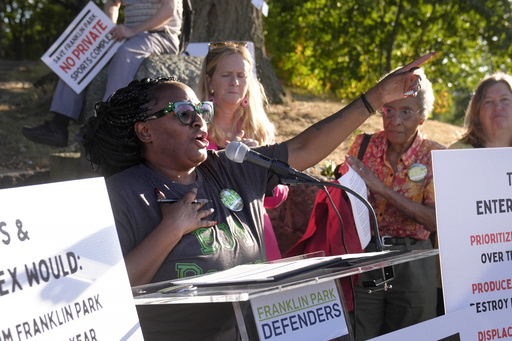
BOSTON — Jack Shapiro, the quarterback for the esteemed Boston Latin Academy, has enjoyed playing at the iconic White Stadium, yet this season he will find himself practicing on a field nearby instead. The historic venue, which has stood for 75 years, remains inaccessible due to its planned renovation. In its stead, a new cutting-edge $200 million sports facility is set to be constructed for Boston’s emerging professional women’s soccer team, BOS Nation FC, with a targeted completion in 2026.
Shapiro expressed disappointment about the team’s circumstances, stating, “We’re all a little disappointed not to have our home this year.” Due to the renovation, Boston Latin Academy has been forced to relocate its home games to West Roxbury, requiring a 45-minute bus ride for players. While the new facility is expected to be available for the city’s school system, Boston Latin Academy and another school team may have to find alternate locations for their games. The hope remains that they might still get to play at the new stadium, but uncertainty looms.
City officials indicated that both Latin Academy and another team, who traditionally use White Stadium for their games, would need to seek other fields due to concerns about potential harm to the playing surface. However, they promised that all city schools might have the opportunity for end-of-year games, including championships, to be held there.
Concern arises among teams about the potential lack of access to the new facility, as coach Rocco Zizza voiced worries while standing outside the stadium, referring to the impending changes as a potential “tombstone” for high school football in the area.
Opposition is growing against this project, including preservationists, environmentalists, and community activists who fear that the collaboration between the city and a corporate entity may restrict public access to the stadium and surrounding green spaces. Supporters of the project counterargue that it represents a valuable opportunity to establish a women’s professional soccer presence in Boston while enhancing school facilities.
White Stadium has served as an essential recreational area, situated amid some of Boston’s most diverse yet economically challenged neighborhoods. It has been a place for leisurely morning walks, high school sporting events, concerts, and summer camps. Franklin Park, which encompasses nearly 530 acres and includes the Franklin Park Zoo, is part of the renowned Emerald Necklace parks designed by Frederick Law Olmsted.
Louis Elisa, a local resident and part of the lawsuit aimed at halting the development, warned that the project would significantly harm both the environment and the community. The legal challenge claims that the approval process was expedited without adequate public consultation and violates state law since it involves converting public land for private use. Opponents also express concerns that the influx of fans attending BOS Nation FC games would lead to heavy traffic and noise issues in nearby areas.
Elisa, who serves as president of the Garrison-Trotter Neighborhood Association, emphasized that investing in the stadium’s restoration could be achieved for a fraction of the proposed budget, roughly under $20 million.
Supporters of the development, including Boston Mayor Michelle Wu, assert that this partnership is essential to address the necessary renovations and will enhance both the neighborhood and the experience for local students. They note that previous attempts to improve White Stadium have failed due to funding issues and opposition from the community.
Although the city schools will manage the stadium, BOS Nation FC will handle operational costs and upkeep. Mayor Wu pointed out that the stadium has been in dire need of improvements, mentioning the deteriorating track and inadequate facilities. She believes that the project aligns with the park’s mission, which is intended to cater to both quiet enjoyment and community events.
Jennifer Epstein, the controlling owner of the professional women’s soccer team, stressed that the new stadium would allow them to establish a deeper connection with local schools and the community. She projected that the upgraded facility would triple the programming available to students and double community access, highlighting its significance as one of the few venues dedicated to women’s professional soccer.
Despite the ongoing dialogue about the project, supporters faced recent hurdles, including dramatically increasing renovation costs. Mayor Wu disclosed that the total expense, shared between the team and the city, has nearly surged to $91 million, prompting skepticism among some City Council members concerning the financial viability of the project. City Councilor Ed Flynn called for a reevaluation, advocating for collaboration with community members to develop a more satisfactory plan.
Time is another critical consideration, as proponents warned that delays related to the legal proceedings could jeopardize the entire project. There’s optimism that the lawsuit will eventually be resolved in favor of the development.
The team is also soliciting feedback on its name after facing backlash over a previously criticized marketing initiative. They initiated a process to consider public input regarding the team’s branding.
While opponents support the idea of a women’s professional soccer team, they stand firmly against its location in Franklin Park. Member Renee Stacy Welsh of the Franklin Park Defenders reiterated their commitment to safeguarding the historic park from being turned into a large-scale sports and entertainment complex, expressing confidence in their cause.

